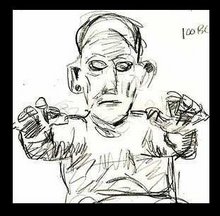This is Art (because I said so)
"...here's another level at which I would like to say that much more profoundly; it's something I didn't talk about at all because it's a difficult issue to explain. What is cultural value and how does that come about? Nearly all of the history of art history is about trying to identify the source of value in cultural objects. Color theories, and dimension theories, golden means, all those sort of ideas, assume that some objects are intrinsically more beautiful and meaningful than others. New cultural thinking isn't like that. It says that we confer value on things. We create the value in things. It's the act of conferring that makes things valuable. Now this is very important, because so many, in fact all fundamentalist ideas rest on the assumption that some things have intrinsic value and resonance and meaning. All pragmatists work from another assumption: no, it's us. It's us who make those meanings" - Brian Eno's big theory of CultureThere is a debate in Mathematics philosophy whether Math is something ”out there” and mankind is slowing discovering more and more and more of "Math", kind of like mining a rare metal. And the contrary view is that math is a man made thing; more concisely put by asking “are new mathematical truths discovered or invented? ”
The discovering approach is usually referenced to Plato and his notion that there is an “ideal” somewhere (I never investigated enough to find out where) and the other is...when the non-Platonic view.*
Anyway, even though I a not a mathematician I vote for the non Platonic view AND I think it applies to cultural opinions. I suppose people will acknowledge tastes in art and music change over time, at least in theory. But often if you don't agree with some audiophile on some band, or an ardent movie buff on their top 10 list, you find their opinions presented as fact.
I think strongly held views on the arts are actually adopted as cultural identifiers and there is meaning attached to the opinion that ties the believer to some other group. So if, back in the day, one was a huge Wilco or Flaming Lips fan, it meant something much more than you like the music. Yet for the fan, the “goodness” of a band or artist is felt and discussed in terms of its quality as if it was assayed from some nebulous yet consistent standard of goodness. And all of that is a declaration that they are not Whitney Houston or Madonna (to keep the references in the same era) fans.
And it is my contention the notions of good or bad in the arts is determined by implied group identified with that fan-dom. Not that every opinion has a social club, rather culture and the arts are human inventions and their “quality” although felt to be unassailable could just as well be deemed trash in some sci-fic like alternate universe.
The downside for me is it means I have to admit somebody like Leroy Nieman could be the pinnacle of fine art instead of the nauseating hack he is in actuality.
All that said, it raised the question what constitutes “Quality”? I seem to recall that was addressed in Zen and the Art of Motorcycle Maintenance. Maybe I will get around to re-reading it after 30+ .years
Ref #5 Brian Eno's non-Platonic view of culture
Links
http://www.edge.org/conversation/a-big-theory-of-culture
http://en.wikipedia.org/wiki/Readymades_of_Marcel_Duchamp
https://www.sciencenews.org/article/still-debating-plato
*My Contribution to the philosophy of math debate
http://www.virtual-weltanschauung.com/pmwiki/pmwiki.php?n=Main.Answer
Oh yeah, Brian Eno's big theory of culture prompted my Grand Theory of Everything



